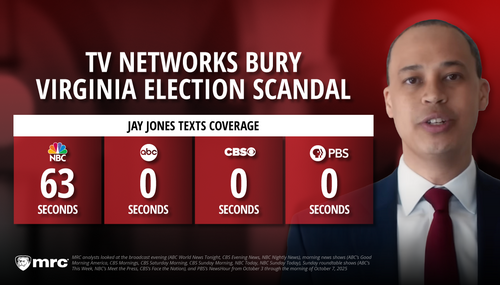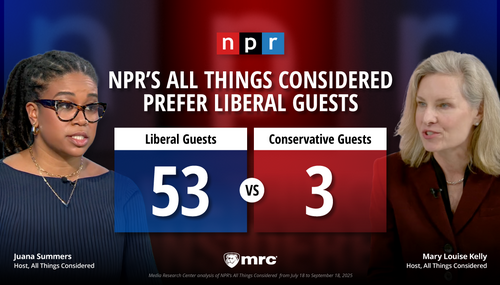 The Washington Post's Christine Emba and Karen Attiah promoted the leftist race theory of "white privilege" in a Saturday video posted on the newspaper's website. The two op-ed writers blamed "white privilege" for the hands-off approach to the occupation of a federal wildlife refuge in Oregon: "White privilege means being able to take over a federal building; to be armed to the teeth; and to threaten violence, if necessary; and yet, you're still not seen as a threat to national security. In fact, you get to live to tell the tale." [video below]
The Washington Post's Christine Emba and Karen Attiah promoted the leftist race theory of "white privilege" in a Saturday video posted on the newspaper's website. The two op-ed writers blamed "white privilege" for the hands-off approach to the occupation of a federal wildlife refuge in Oregon: "White privilege means being able to take over a federal building; to be armed to the teeth; and to threaten violence, if necessary; and yet, you're still not seen as a threat to national security. In fact, you get to live to tell the tale." [video below]
Emba and Attiah also credited "white privilege" for an apparent double standard in treating two crises with heroin — one in the 1970s and '80s and the present-day one. Emba underlined that "back then, the response was to start a war on drugs and drug users — and not even drug users, but crack-heads who are black and poor. Today, of course, the response to the heroin crisis is — you know, it's a public health crisis. It's a mental health issue. We need to be kind to addicts." Attiah contended, "In a nutshell, black drug use and addition equals incarceration, criminalization. White drug use and addition equals compassion, concern."
The two Washington Post writers led their video, "White privilege, explained," by defining "white privilege" as "a life-easing level of advantage that comes with just being Caucasian in America — no matter your wealth, gender, or any other status. It's about whiteness being the baseline or the norm." Emba pointed to a 1988 paper by a feminist academic at Wellesley College, Peggy McIntosh, which defined "white privilege" as "a set of 'unearned and unnoticed assets' that white people in America have."
Emba and Attiah continued by countering the critics of the radical theory:
CHRISTINE EMBA, IN THEORY, THE WASHINGTON POST: Of course, the first criticism is always, 'I may be white, but I'm not privileged.' And yes, there are white people who aren't wealthy, and there are minorities who are. But white privilege is something different and specific. It's the idea that just by being white in America, you're respected; you're assumed the best of; you're given the benefit of the doubt. And that doesn't happen for minorities — no matter how smart, wealthy, or otherwise privileged they might be.
KAREN ATTIAH, DEPUTY DIGITAL EDITOR, OPINIONS: The critics of white privilege will point to things like affirmative action, or efforts to attract and retain people of color into elite colleges or into the workplace; and they'll say — look, there's no such thing as white privilege, because people of color are taking spots from more qualified white people.
EMBA: But the thing about white privilege is that you can assume that you'll always have a spot. You don't need to fight to be included at the table.
After outlining their "white privilege" explanations about the standoff in Oregon and the treatment of the two heroin epidemics, the Washington Post writers spotlighted a supposed cultural influence of "white privilege" regarding how singer Katy Perry is seen as "America's cutesy, cupcake-wearing, pop-singing sweetheart," even as she wears African American hairstyles and works with hip-hop artists. However, at the same time, "black artists like Nicki Minaj or Beyonce...no matter what they do, they're still seen as ghetto or angry or oversexed."
Emba repeated many of the same points in a January 16, 2016 item on WashingtonPost.com, "What is white privilege?" She also asserted that "others denounce the term as a weapon used to guilt, shame, and silence, pointing at presumably well-meaning students told by holier-than-thou faculty and classmates to 'check their privilege.' Yet while the term can be used to silence, that's more the fault of a rude terminology-wielder than of the concept itself. All sorts of normally harmless words have been deployed to guilt people and suppress speech — 'unpatriotic' and 'elitist' come to mind."
It should be pointed out that the two op-ed writers own biographies cast cold water on the theory of "white privilege." Both are Ivy League-educated (Emba holds an A.B. from Princeton University, and Attiah has a master's degree from Columbia University). Attiah also was a Fulbright Scholar in 2008.
The full transcript of the January 16, 2016 WashingtonPost.com video, "White privilege, explained:"
UNIDENTIFIED WOMAN (from Fusion Democratic presidential forum): Secretary Clinton, can you tell us what the term 'white privilege' means to you?
DON LEMON (from CNN Newsroom): Do you agree that there is such a thing — and we've been hearing a lot about it now — as white privilege?
JON STEWART (to Bill O'Reilly, from Comedy Central's The Daily Show): I want you to admit that there is such a thing as white privilege.
CHRISTINE EMBA, IN THEORY, THE WASHINGTON POST: White privilege is a life-easing level of advantage that comes with just being Caucasian in America — no matter your wealth, gender, or any other status.
KAREN ATTIAH, DEPUTY DIGITAL EDITOR, OPINIONS: It's about whiteness being the baseline or the norm. It's about advantages that are conferred and not earned, solely based on the fact that you are part of the majority group in America.
EMBA: So, one early source is this academic paper published in 1988 called, 'White Privilege: Unpacking The Invisible Knapsack.' And it described white privilege as a set of 'unearned and unnoticed assets' that white people in America have. They may not be aware of them, but they can assume that they're able to cash in these assets any time they need to.
EMBA: Of course, the first criticism is always, 'I may be white, but I'm not privileged.' And yes, there are white people who aren't wealthy, and there are minorities who are. But white privilege is something different and specific. It's the idea that just by being white in America, you're respected; you're assumed the best of; you're given the benefit of the doubt. And that doesn't happen for minorities — no matter how smart, wealthy, or otherwise privileged they might be.
ATTIAH: The critics of white privilege will point to things like affirmative action, or efforts to attract and retain people of color into elite colleges or into the workplace; and they'll say — look, there's no such thing as white privilege, because people of color are taking spots from more qualified white people.
EMBA: But the thing about white privilege is that you can assume that you'll always have a spot. You don't need to fight to be included at the table.
ATTIAH: White privilege means being able to take over a federal building; to be armed to the teeth; and to threaten violence, if necessary; and yet, you're still not seen as a threat to national security. In fact, you get to live to tell the tale.
EMBA: Completely true.
And we have a heroin epidemic going on today. And, of course, there was a heroin crisis in the '70s and '80s. But back then, the response was to start a war on drugs and drug users — and not even drug users, but crack-heads who are black and poor.
Today, of course, the response to the heroin crisis is — you know, it's a public health crisis. It's a mental health issue. We need to be kind to addicts.
ATTIAH: In a nutshell, black drug use and addition equals incarceration, criminalization. White drug use and addition equals compassion, concern.
EMBA: So, you have white artists like Katy Perry — she can wear corn-rows. She can collaborate with rappers. But she's still seen as America's cutesy, cupcake-wearing, pop-singing sweetheart. But then, you have black artists like Nicki Minaj or Beyonce; and no matter what they do, they're still seen as ghetto or angry or oversexed.
ATTIAH: So, what's the takeaway from all this?
EMBA: I mean, one thing to remember is that a lot of this unintentional. Having white privilege doesn't necessarily make you a racist. But it is worth acknowledging the advantages that you do have, and considering that other people might not be advantaged in the same way.





